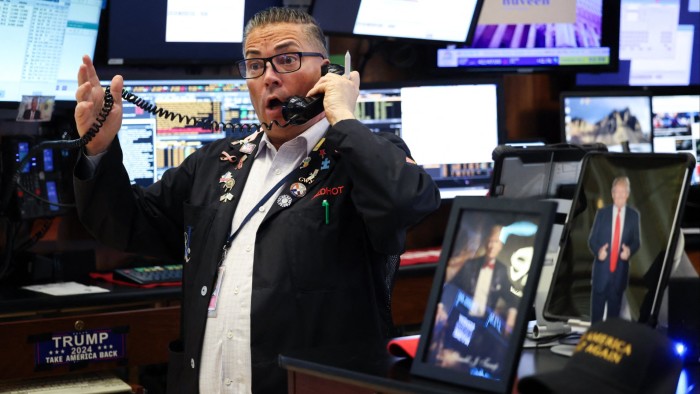Unlock the White House Watch newsletter for free
Your guide to what the 2024 US election means for Washington and the world
The US stock market absolutely hates President Donald Trump’s tariff proposals. The day after they were announced, the S&P 500 fell 5 per cent, its worst day since 2020, and the pain continued on Friday. Tech stocks, small companies and banks are getting the worst of it. At one level, this is easy to explain: everyone agrees that tariffs will increase costs for US companies and drag their earnings down, at least in the short and medium terms. Stocks are priced in part on earnings.
Depending on your personal theory of how tariffs work, you might think lower earnings and stock prices today are an acceptable price to pay for, say, higher domestic production and wages tomorrow. That appears to be what Trump meant when he said tariffs would cause “a little disturbance, but we’re OK with that”.
But markets have a bigger problem than the prospect of short-term falling profits. Investors and companies can adjust to most things, when they know the rules. With Trump, the rules are always changing.
When any new policy is introduced, markets have to price in not just the policy’s effects, but an estimate of how long it will last. So the correction we are seeing — as of writing this, the S&P 500 is 15 per cent off its all-time high in February — is in part an estimate of the damage tariffs will do and in part an estimate of how long they will last.
But the market has a third, even harder valuation puzzle to solve, because Trump’s tariff policy will always be a moving target. How do you price that in?
You can see why by looking at the way the administration calculated its trade partners’ supposed tariff rates. The formula is based on the size of each country’s trade deficit with the US, relative to its total exports to the US. These “reciprocal” tariffs are not calculated on the tariffs or non-tariff barriers other countries imposed on the US, as Trump said. They’re just based on deficits.
This assumes that deficits can only result from unfair trade practices, which is just false. Should the US have balanced trade with countries that don’t sell things we need, but need what we produce? Or the other way around? The Trump administration’s policy is not just wrong, it’s dishonest: the 10 per cent minimum tariff on all countries, regardless of tariffs or deficits, is by definition not reciprocal. This stuff is simply crazy. As former Treasury secretary Larry Summers put it, it is to economics what creationism is to biology.
Anyone with firmly held false beliefs will have regular, unpleasant run-ins with reality. They change course, only to drive right back into the same ditch. Trump won’t get what he wants from his tariff policy, so he will keep changing it, leaving markets scrambling to catch up. The tactics will zigzag as the fundamental strategic error remains.
Trump’s tariff calculation is just one example of the un-priceable chaos that markets find themselves in. The outlines of the policy were not telegraphed in advance and came as a massive surprise. And the TV appearance of Trump’s economic advisers both before and after the announcement seemed designed to alarm investors. Neither commerce secretary Howard Lutnick nor Treasury secretary Scott Bessent appeared to have been briefed beforehand or prepared to explain the next steps afterward. Was this world-changing policy written in a cram session the night before?
The utter strangeness of the whole performance was mirrored by unusual doings in markets in the aftermath of “liberation day”. US tariffs on the rest of the world, all else being equal, should drive the value of the dollar up (by sapping US demand for imports, they sap demand for foreign currencies). A global economic shock should also drive demand for the dollar — it has long been the world’s safe haven. But the dollar has weakened. The simplest explanation is that investors see a new level of uncertainty in dollars and dollar-denominated assets, and they are getting out of the way.
Trump, one might argue, was just as mercurial in his first term as he is today, and markets prospered. But the global context has changed dramatically since then. US stocks and risk assets in general are significantly more expensive, relative to history and other markets, than they were in 2017. The budget deficit and the national debt are much higher, leaving the government with less fiscal space, should stimulus be needed. The inflation genie is out of the bottle too, reducing the room for monetary easing by the central bank. And the US economy was already slowing from the unsustainable growth rates of the post-pandemic boom. China’s economy, once the world’s growth engine, is wobbly.
None of these facts are economic destiny, but the situation is much more delicate and unpredictable than eight years ago. A steady hand would really help.
Markets, companies and economies are wonderfully supple things. Given time, they will make the trade-offs that high tariffs require. But the capricious policymaking style of the Trump administration has no upside. All it produces is deadweight loss.
Read the full article here




